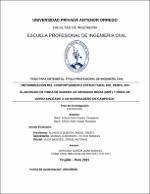Determinación del comportamiento estructural del perfil en I elaborado de fibra de madera de densidad media (MDF) y fibra de vidrio aplicado a un invernadero de Camposol

View/
Download
(application/pdf: 11.53Mb)
(application/pdf: 11.53Mb)
Date
2021Author(s)
Artaza Coro, Franco Yampierre
Olivos Solís, Susan Rossana
Metadata
Show full item recordAbstract
Se identificó un error muy común, el cual fue intentar solucionar la presencia de salitre de
manera superficial en las edificaciones, siendo lo correcto solucionar el problema desde el
interior de la estructura para asegurar la duración de la edificación. Este problema también se
identificó en estructuras metálicas o de maderas en los cuales no es muy fácil de percatarse, a
pesar de traer graves problemas para la salud. Considerando estas agresivas las condiciones
atmosféricas e hidrográficas presentes en la costa del Perú, proponemos remplazar estructuras
livianas tradicionalmente construidas de acero.
El trabajo tuvo como propósito obtener un nuevo perfil en I elaborado con fibra de madera de
densidad media (MDF) cubierta de fibra de vidrio, y determinar las propiedades físicas y
geométricas de la sección del perfil que resistan a un alto nivel de humedad.
Se elaboró el ensayo de flexión en el laboratorio de la Universidad Privada Antenor Orrego,
haciendo uso de la máquina Universal, para determinar los diagramas de esfuerzo vs
deformación de las muestras de MDF de 3mm, 4mm, 5.5mm y la resina de fibra de vidrio, para
obtener el módulo de elasticidad, la resistencia a la fluencia, el módulo de resiliencia, el
coeficiente de poisson, el esfuerzo último, la ductilidad, la tenacidad, el esfuerzo al límite
proporcional elástico y el esfuerzo de rotura.
Se elaboró el diseño del perfil de MDF con fibra de vidrio, determinando la máxima tensión
normal, la máxima tensión tangencial y la combinación de ambas tensiones, logrando que sean
menor al esfuerzo admisible, para que según la normativa cumplan y puedan reemplazar al perfil
metálico, que se viene utilizando en el invernadero de empresa agroindustrial Camposol A very common error was identified, which was to try to solve the presence of saltpeter in a
superficial way in the buildings, being the correct thing to solve the problem from inside the
structure to ensure the duration of the building. This problem was also identified in metal or
wooden structures in which it is not very easy to notice, despite causing serious health problems.
Considering the great aggressiveness of the atmospheric and hydrographic conditions present
on the Peruvian coast, we propose a material to replace light structures traditionally built with
steel.
The purpose of the work was to obtain a new profile in form of “I”, made with medium
density wood fiber (MDF) and fiberglass, and to determine the physical and geometric properties
of the profile section that resist a high level of humidity.
The bending test was developed in Antenor Orrego Private University’s laboratory, using the
the Universal Machine to determine the stress vs deformation diagram from MDF samples of the
3mm, 4mm and 5.5mm and fiberglass resin to obtain the elasticity modulus, the yield strength,
modulus of resilience, poison’s ratio, ultimate stress, ductility, toughness, stress at yield point,
and breaking stress.
The design of the MDF profile with fiberglass was elaborated, determining the maximum
normal stress, the maximum tangential stress and the combination of both stresses, making them
less than the admissible stress, so that according to the regulations they comply with and can
replace the metal profile, which has been used in the greenhouse of the Camposol agro-industrial
company
Collections
- Ingeniería Civil [1260]

